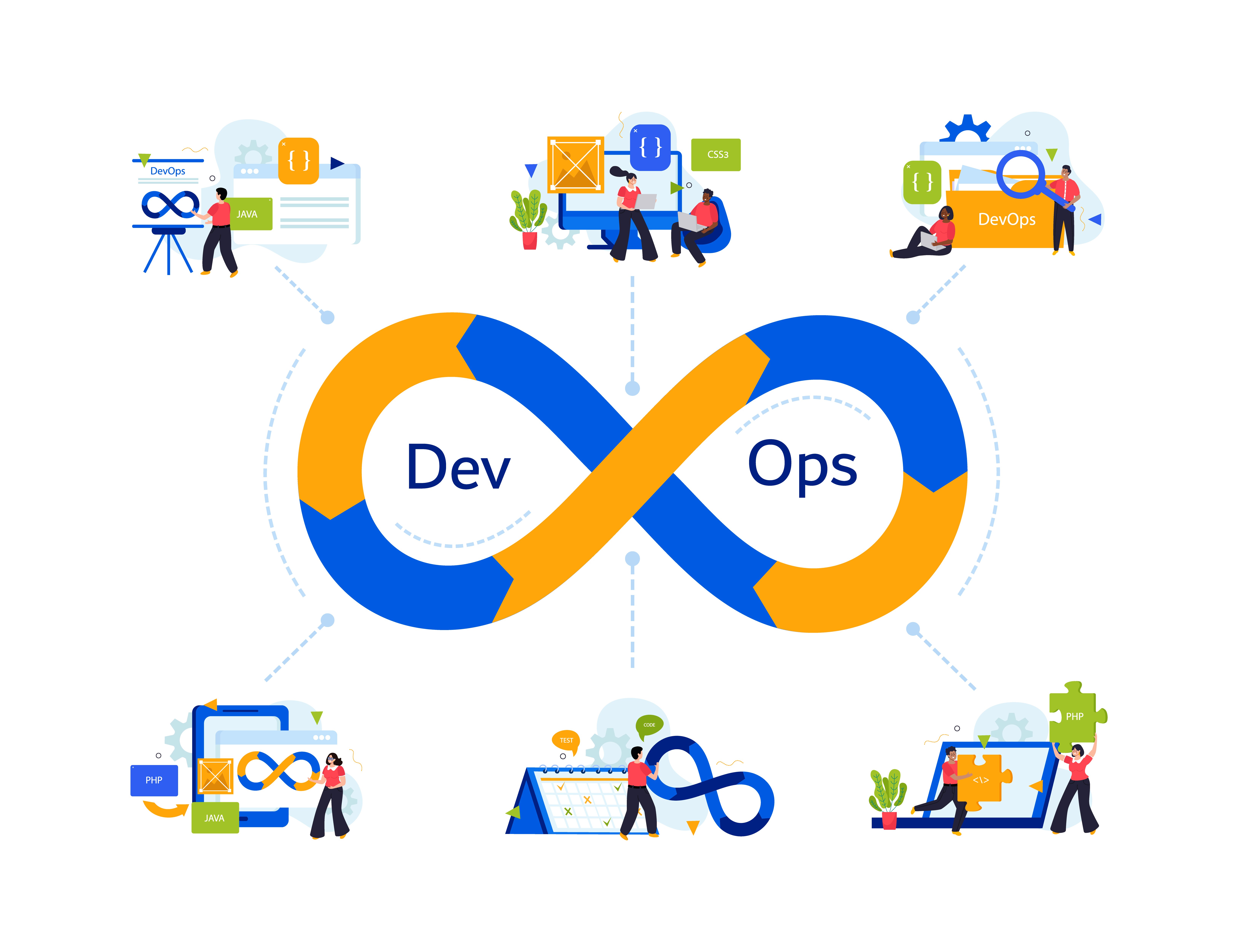Prerequisties for DevOps: How to Become DevOps Engineer in 2024
Prerequisties for DevOps: How to Become DevOps Engineer in 2024
Oct 7, 2024
Jithin
Oct 7, 2024


Jithin





Essential Prerequisties You Need to Become a DevOps Engineer in 2024

Just imagine that you are sitting in a bustling tech office, surrounded by screens filled with code, deployment pipelines, and infrastructure diagrams. The air buzzes with excitement as your team celebrates another successful product launch – weeks ahead of schedule. How happy is that moment for you? Welcome to the world of DevOps, where innovation meets efficiency, and you are the maestro orchestrating this digital symphony.
Intrigued? Yes, you should be. As the tech landscape continues to evolve at breakneck speed, you are likely aware of how crucial it is for businesses to streamline their software development and deployment and IT operations, making everything from code integration to system monitoring smoother and faster.
Whether you are just starting your career or looking to upskill, the role of a DevOps engineer in 2024 promises to be both rewarding and in high demand. But what does it take to thrive in this field? In this blog, we will explore the essential prerequisites, skills, and steps you need to succeed as a DevOps engineer in today’s fast-paced tech world. If you are curious about mastering the key tools, technologies, and methodologies that define modern DevOps, this guide will help you build a roadmap to success.
Ready to transform your tech career?
Before we jump into the nitty-gritty, let's get right in our basics. DevOps isn't just another tech buzzword – it's a game-changer in the software development world.
What Does a DevOps Engineer Do?
A DevOps engineer is like the Swiss Army knife of the tech world. They bridge the gap between coding and deployment, ensuring smooth sailing from development to production. It's a role that requires a unique blend of skills, from coding to problem-solving and everything in between.
Is DevOps Still Hot in 2024?
You bet it is! The demand for DevOps engineers is skyrocketing, and it's not slowing down anytime soon. Companies are realising that DevOps isn't just a trend – it's a necessity for staying competitive in today's tech world.
Why Pick DevOps?
You need to know why before you choose your path into becoming a DevOps engineer. As businesses continue their digital transformations, the need for faster, more efficient software deployment increases. DevOps practices help organizations achieve these goals by reducing deployment cycles, improving deployment frequency, and allowing teams to respond to market needs more swiftly. In 2024, cloud computing, containerization, microservices, and continuous integration/continuous delivery(CI/CD) pipelines will be even more central to DevOps operations.
The global DevOps market is expected to grow rapidly, driven by an increasing focus on automation, the proliferation of cloud-native technologies, and the need for speed and efficiency in the software development process. Now, let's dive into the core prerequisites for becoming a DevOps engineer in 2024.
Prerequisites of a DevOps Engineer: Your Roadmap to Success
Are you ready to become a DevOps wizard? Here's what you need to pack in your toolkit:
1. Coding Chops
First things first – you've got to speak the language of machines. While you don't need to be a coding prodigy, a solid grasp of programming basics is crucial. Python, Java, or Ruby – take your pick and start coding!
2. System Administration Skills
DevOps engineers need to be comfortable with both Windows and Linux environments. Get ready to roll up your sleeves and dive into the command line!
3. Networking Know-How
Understanding how data flows through networks is the key. Brush up on your networking concepts – they will come in handy more often than you think.
4. Cloud Computing Expertise
The cloud is where it's at! Familiarize yourself with major cloud platforms like AWS, Azure, or Google Cloud. Trust me, it's worth the effort.
5. Containerization and Orchestration
Docker and Kubernetes are the dynamic duo of the DevOps world. Learn to containerize applications and orchestrate them like a pro.
6. Continuous Integration/Continuous Deployment (CI/CD)
Automate, automate, automate! Get comfortable with CI/CD tools like Jenkins or GitLab. They are the backbone of efficient software delivery.
7. Infrastructure as Code (IaC)
Terraform, Ansible, or Chef – pick your favourite. These tools will help you manage infrastructure with the same finesse as writing code.
8. Version Control
Git is your new best friend. Master version control to keep your code organized and your team happy.
9. Monitoring and Logging
Learn to keep an eagle eye on your systems. Tools like Prometheus and ELK stack will be your go-to for troubleshooting and optimization.
10. Soft Skills: The Secret Sauce
Don't forget the human element! DevOps engineers must be excellent communicators and collaborators, as they often work across various teams(developers, operations, QA) to ensure smooth software delivery.
DevOps Certification: To Certify or Not to Certify?
Certifications can give your career a fine boost. Consider getting certified as an AWS Certified DevOps Engineer or Azure DevOps Engineer. It will turn as a golden shower on your resume!

The DevOps Career Path: Where Can You Go?
You can start as a junior DevOps engineer, and work your way up to senior roles or even become a DevOps architect. The sky's the limit!
DevOps Tools: Your Arsenal for Success
Here's a quick rundown of some essential DevOps tools you need to get familiar with:
Version Control: Git, GitHub
CI/CD: Jenkins, GitLab CI
Configuration Management: Ansible, Puppet
Containerization: Docker, Kubernetes
Cloud Platforms: AWS, Azure, Google Cloud
Monitoring: Nagios, Prometheus
Learning DevOps: Where to Start?
How to Kickstart Your DevOps Journey:
Online courses:
Platforms like Coursera, Skillect and Udemy offer great DevOps courses.
Hands-on projects:
Nothing beats practical experience. Start small and build your way up.
Join DevOps communities:
Engage with fellow enthusiasts on forums and social media.
Read, read, read:
Stay updated with the latest DevOps trends and best practices.
The DevOps Culture: More Than Just Tools
DevOps is as much about culture as it is about technology. Embrace collaboration, continuous improvement, and a willingness to learn.
DevOps Engineer Salary: The Cherry on Top
Let's talk about money, shall we? DevOps engineers are in high demand, and the salaries reflect that. While it varies by location and experience, you can expect a pretty sweet paycheck in this field. So, choose your career in a wise manner.
Becoming a Site Reliability Engineer: A Natural Progression
As you grow in your DevOps career, you might find yourself gravitating towards Site Reliability Engineering (SRE). It's a natural next step for many DevOps professionals.
Quick Roadmap to Guide Your DevOps journey:
Learn the basics of programming and system administration
Get comfortable with Linux and networking concepts
Dive into cloud computing and containerization
Master CI/CD and IaC
Develop your soft skills
Consider getting certified
Keep learning and stay updated with the latest trends
To sum it up, here are the key skills you need to focus on:
Programming
System administration
Cloud computing
Containerization and Orchestration
CI/CD
Infrastructure as Code
Monitoring and Logging
Soft skills
Remember, automation is at the heart of DevOps. Always be on the lookout for processes you can automate to improve efficiency.
DevOps Job Market: Hot and Getting Hotter
The job market for DevOps engineers is booming, with no signs of slowing down. Companies across industries are looking for skilled DevOps professionals to streamline their operations. So, it's your chance to become a DevOps professional and shine in your career.
Conclusion: Your DevOps Journey Starts Now
Embarking on a DevOps career is an exciting adventure. It's challenging, rewarding, and never boring. With the right skills and mindset, you'll be well on your way to becoming a DevOps superstar.
Do you want to take the next step? Check out Skillect's comprehensive DevOps courses and start your journey today. Our expert-led programs are designed to give you the perfect skills and knowledge you need to succeed in the world of DevOps.
Apply now at Skillect and transform your tech career!
Remember, the world of DevOps is ever-evolving, so keep learning, stay curious, and never stop improving. You have got this!
Essential Prerequisties You Need to Become a DevOps Engineer in 2024

Just imagine that you are sitting in a bustling tech office, surrounded by screens filled with code, deployment pipelines, and infrastructure diagrams. The air buzzes with excitement as your team celebrates another successful product launch – weeks ahead of schedule. How happy is that moment for you? Welcome to the world of DevOps, where innovation meets efficiency, and you are the maestro orchestrating this digital symphony.
Intrigued? Yes, you should be. As the tech landscape continues to evolve at breakneck speed, you are likely aware of how crucial it is for businesses to streamline their software development and deployment and IT operations, making everything from code integration to system monitoring smoother and faster.
Whether you are just starting your career or looking to upskill, the role of a DevOps engineer in 2024 promises to be both rewarding and in high demand. But what does it take to thrive in this field? In this blog, we will explore the essential prerequisites, skills, and steps you need to succeed as a DevOps engineer in today’s fast-paced tech world. If you are curious about mastering the key tools, technologies, and methodologies that define modern DevOps, this guide will help you build a roadmap to success.
Ready to transform your tech career?
Before we jump into the nitty-gritty, let's get right in our basics. DevOps isn't just another tech buzzword – it's a game-changer in the software development world.
What Does a DevOps Engineer Do?
A DevOps engineer is like the Swiss Army knife of the tech world. They bridge the gap between coding and deployment, ensuring smooth sailing from development to production. It's a role that requires a unique blend of skills, from coding to problem-solving and everything in between.
Is DevOps Still Hot in 2024?
You bet it is! The demand for DevOps engineers is skyrocketing, and it's not slowing down anytime soon. Companies are realising that DevOps isn't just a trend – it's a necessity for staying competitive in today's tech world.
Why Pick DevOps?
You need to know why before you choose your path into becoming a DevOps engineer. As businesses continue their digital transformations, the need for faster, more efficient software deployment increases. DevOps practices help organizations achieve these goals by reducing deployment cycles, improving deployment frequency, and allowing teams to respond to market needs more swiftly. In 2024, cloud computing, containerization, microservices, and continuous integration/continuous delivery(CI/CD) pipelines will be even more central to DevOps operations.
The global DevOps market is expected to grow rapidly, driven by an increasing focus on automation, the proliferation of cloud-native technologies, and the need for speed and efficiency in the software development process. Now, let's dive into the core prerequisites for becoming a DevOps engineer in 2024.
Prerequisites of a DevOps Engineer: Your Roadmap to Success
Are you ready to become a DevOps wizard? Here's what you need to pack in your toolkit:
1. Coding Chops
First things first – you've got to speak the language of machines. While you don't need to be a coding prodigy, a solid grasp of programming basics is crucial. Python, Java, or Ruby – take your pick and start coding!
2. System Administration Skills
DevOps engineers need to be comfortable with both Windows and Linux environments. Get ready to roll up your sleeves and dive into the command line!
3. Networking Know-How
Understanding how data flows through networks is the key. Brush up on your networking concepts – they will come in handy more often than you think.
4. Cloud Computing Expertise
The cloud is where it's at! Familiarize yourself with major cloud platforms like AWS, Azure, or Google Cloud. Trust me, it's worth the effort.
5. Containerization and Orchestration
Docker and Kubernetes are the dynamic duo of the DevOps world. Learn to containerize applications and orchestrate them like a pro.
6. Continuous Integration/Continuous Deployment (CI/CD)
Automate, automate, automate! Get comfortable with CI/CD tools like Jenkins or GitLab. They are the backbone of efficient software delivery.
7. Infrastructure as Code (IaC)
Terraform, Ansible, or Chef – pick your favourite. These tools will help you manage infrastructure with the same finesse as writing code.
8. Version Control
Git is your new best friend. Master version control to keep your code organized and your team happy.
9. Monitoring and Logging
Learn to keep an eagle eye on your systems. Tools like Prometheus and ELK stack will be your go-to for troubleshooting and optimization.
10. Soft Skills: The Secret Sauce
Don't forget the human element! DevOps engineers must be excellent communicators and collaborators, as they often work across various teams(developers, operations, QA) to ensure smooth software delivery.
DevOps Certification: To Certify or Not to Certify?
Certifications can give your career a fine boost. Consider getting certified as an AWS Certified DevOps Engineer or Azure DevOps Engineer. It will turn as a golden shower on your resume!

The DevOps Career Path: Where Can You Go?
You can start as a junior DevOps engineer, and work your way up to senior roles or even become a DevOps architect. The sky's the limit!
DevOps Tools: Your Arsenal for Success
Here's a quick rundown of some essential DevOps tools you need to get familiar with:
Version Control: Git, GitHub
CI/CD: Jenkins, GitLab CI
Configuration Management: Ansible, Puppet
Containerization: Docker, Kubernetes
Cloud Platforms: AWS, Azure, Google Cloud
Monitoring: Nagios, Prometheus
Learning DevOps: Where to Start?
How to Kickstart Your DevOps Journey:
Online courses:
Platforms like Coursera, Skillect and Udemy offer great DevOps courses.
Hands-on projects:
Nothing beats practical experience. Start small and build your way up.
Join DevOps communities:
Engage with fellow enthusiasts on forums and social media.
Read, read, read:
Stay updated with the latest DevOps trends and best practices.
The DevOps Culture: More Than Just Tools
DevOps is as much about culture as it is about technology. Embrace collaboration, continuous improvement, and a willingness to learn.
DevOps Engineer Salary: The Cherry on Top
Let's talk about money, shall we? DevOps engineers are in high demand, and the salaries reflect that. While it varies by location and experience, you can expect a pretty sweet paycheck in this field. So, choose your career in a wise manner.
Becoming a Site Reliability Engineer: A Natural Progression
As you grow in your DevOps career, you might find yourself gravitating towards Site Reliability Engineering (SRE). It's a natural next step for many DevOps professionals.
Quick Roadmap to Guide Your DevOps journey:
Learn the basics of programming and system administration
Get comfortable with Linux and networking concepts
Dive into cloud computing and containerization
Master CI/CD and IaC
Develop your soft skills
Consider getting certified
Keep learning and stay updated with the latest trends
To sum it up, here are the key skills you need to focus on:
Programming
System administration
Cloud computing
Containerization and Orchestration
CI/CD
Infrastructure as Code
Monitoring and Logging
Soft skills
Remember, automation is at the heart of DevOps. Always be on the lookout for processes you can automate to improve efficiency.
DevOps Job Market: Hot and Getting Hotter
The job market for DevOps engineers is booming, with no signs of slowing down. Companies across industries are looking for skilled DevOps professionals to streamline their operations. So, it's your chance to become a DevOps professional and shine in your career.
Conclusion: Your DevOps Journey Starts Now
Embarking on a DevOps career is an exciting adventure. It's challenging, rewarding, and never boring. With the right skills and mindset, you'll be well on your way to becoming a DevOps superstar.
Do you want to take the next step? Check out Skillect's comprehensive DevOps courses and start your journey today. Our expert-led programs are designed to give you the perfect skills and knowledge you need to succeed in the world of DevOps.
Apply now at Skillect and transform your tech career!
Remember, the world of DevOps is ever-evolving, so keep learning, stay curious, and never stop improving. You have got this!
